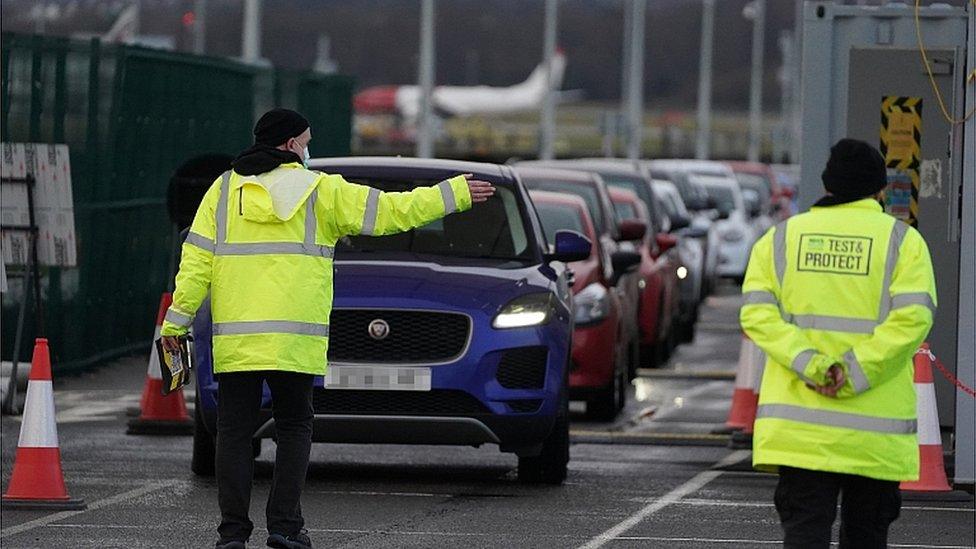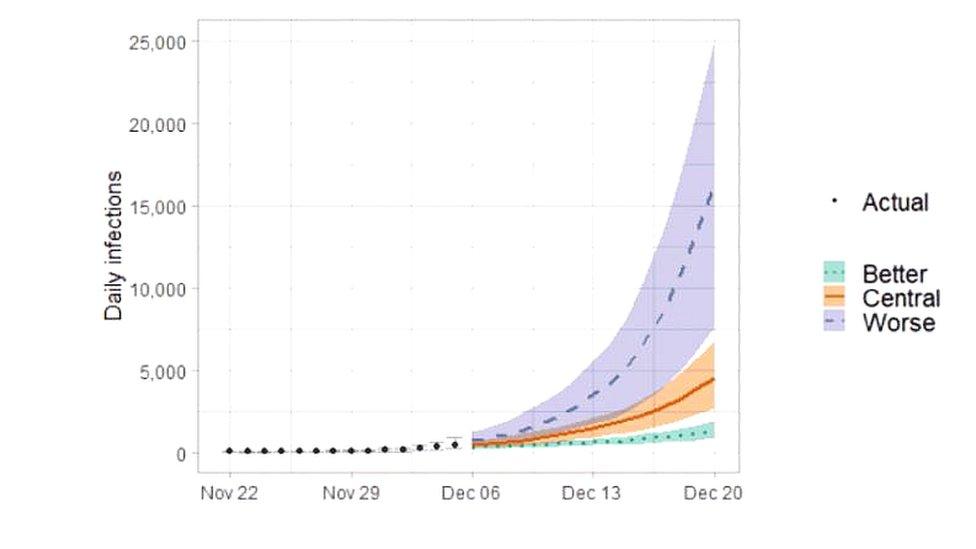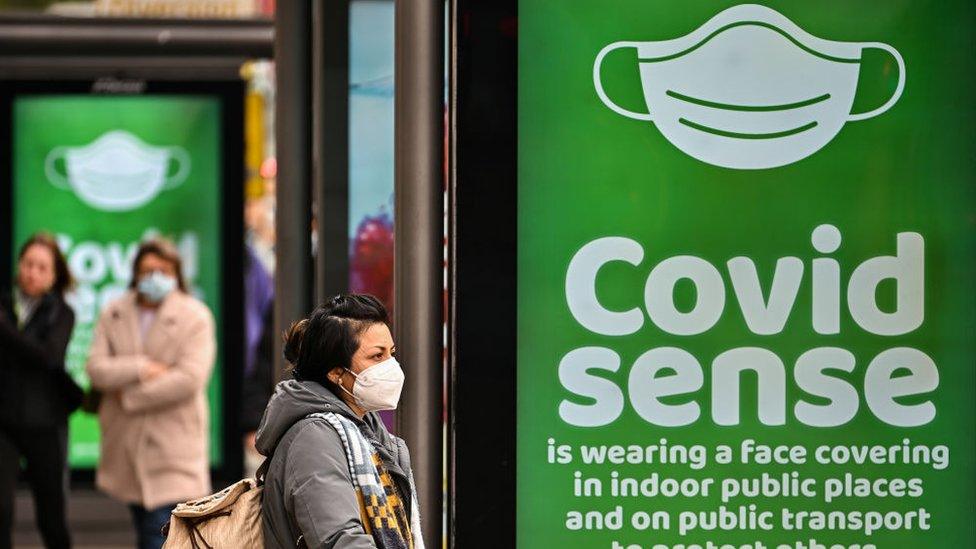Scotland in 'worst case scenario' for Omicron cases
- Published

Cars line up for PCR tests at a drive-through site at Edinburgh Airport
Scotland's current Covid case rates are in line with the worst case scenario, according to the health secretary.
Humza Yousaf has confirmed infections are at the highest level predicted in an evidence paper published in early December.
He said the next two weeks were set to be the "most difficult" faced by the NHS in its 73-year existence.
But he said new data was looking more positive on hospitalisations due to the virus.
Scotland registered 11,360 new positive cases on Thursday - bringing the total number of confirmed cases since the pandemic began to more than a million at 1,010,660.
About one in 20 people in Scotland had Covid last week, according to the Office for National Statistics - up from one in 40 the previous week.
Mr Yousaf warned BBC Radio's Good Morning Scotland programme the peak was yet to come and health chiefs were already making "exceptionally difficult" decisions on prioritising care.
"Certainly we are heading into the peak and expect that in the next few weeks," he said.
"If you remember the paper we published in early December, external, we are clearly into the worse case scenario in terms of levels of infection."

Omicron modelling from the Scottish Government's December evidence paper put daily infections at an average of 16,000 daily cases by the end of December, increasing into January
He said that evidence that Omicron was less severe than other variants suggests there may be a "more optimistic picture in terms of hospitalisations".
However he added: "Our concern continues to be that even a small percentage of a big number at a time when the NHS doesn't have much headroom at all, is putting real pressure, along with staff absences, on the NHS and social care system.
"I don't think there's any way of sugar-coating the fact these next two weeks will probably be amongst the most difficult our NHS has faced in its 73 year existence."
The MSP said the health service was dealing with the backlog from the pandemic, high levels of staff absences, and more than 1,200 people in hospitals with Covid.
"All of those pressures coming during the winter months when we tend to see busier hospitals means this is a perfect storm," he said.
Latest figures for the week until 4 January showed NHS Scotland staff absences due to Covid to be at 5,482 - the highest since June 2020.

The situation in emergency departments across the country is "the worst it has ever been", according to Dr John-Paul Loughrey of the Royal College of Emergency Medicine Scotland, who said medical colleagues were "filled with dread" about the next four to six weeks.
NHS Greater Glasgow and Clyde has told the public to stay away from A&E departments unless their condition is "very urgent or life-threatening" due to the "unprecedented and unsustainable" pressures they are facing.
The board said anyone else should first call NHS24 on 111, which it said would "ensure they are directed to the most appropriate urgent service for their needs and A&Es are safeguarded for those who need them".
Dr Scott Davidson, deputy medical director for acute services at NHSGGC, said A&E units were seeing a large number of people with symptoms that could be managed by speaking to a GP or a local pharmacy.
He added: "There are other services geared up and ready to see and treat you.
"If you've had a slip, trip or fall, we have numerous minor injuries units (MIUs) across NHSGGC which can look after you, including if you've broken a limb."
Opposition parties said the plea from the health board showed that the Scottish government had failed to adequately prepare the NHS for the pressures it was now facing.
Scottish Conservative health spokesman Dr Sandesh Gulhane said: "My colleagues on the frontline are beyond breaking point and have suffered due to Humza Yousaf's inaction and lack of planning ahead of the winter period.
"A&E services have been overwhelmed for months on end and now patients are being told to try and access treatment elsewhere".
His Labour counterpart, Jackie Baillie, said there were also reports of people waiting for more than an hour to get through to NHS24, and called for action from Mr Yousaf "to bring this situation under control immediately".
In the Borders, routine operations and all but essential visiting has been cancelled by the local health board.
New self isolation rules aimed at improving staff shortages in the NHS and key worker roles were announced by First Minister Nicola Sturgeon on Wednesday.
People who test positive for Covid in Scotland are now allowed to exit self-isolation after seven days if they have no fever and record two negative lateral flow tests.
And household contacts of people with the virus are now allowed to take tests rather than going into quarantine, so long as they have had a booster shot.
'Scrupulously honest'
Prof James Chalmers from the University of Dundee's School of Medicine, said it was important people were honest about their lateral flow test results.
He told the BBC: "This isn't that the self-isolation period has been cut from 10 to seven days, it's still 10 days unless you are able to post two negative lateral flow tests, and it's very important that people are scrupulously honest with those negative lateral flow tests.
"If you don't take a lateral flow test, if you just exit self-isolation at day seven, the modelling suggests a 15% risk that you are still infections, so anybody who cheats these rules is putting others at risk because there is still a risk if you don't have those negative lateral flow tests."
Prof Chalmers said that, despite the high number of cases in Scotland, the peak was not expected until later this month.

Humza Yousaf confirms Scotland is experiencing the "worst case scenario" of Omicron cases
Mr Yousaf also told Good Morning Scotland of his "frustration" about changes to the coronavirus testing regime for international travel being announced for England only - despite UK-wide discussions on what the rules should be.
While talks had taken place between the four nations, Prime Minister Boris Johnson announced changes on Wednesday for England only - scrapping pre-departure tests and isolation for travellers.
Instead people will be required to take a lateral flow test no later than the end of day two after their arrival.
Mr Yousaf promised a written update for MSPs in the Scottish Parliament on Thursday afternoon.
But he said: "Although we engaged in a conversation with the UK government, it is a source of frustration that if the UK government unilaterally decides to move in a certain direction we end up with potentially a double whammy if we don't align."
Mr Yousaf said that if Scottish ministers opt to follow a different course, this would cause further damage to the travel industry north of the border, without any public health benefit, as travellers could instead opt to fly to and from English airports.


- Published5 January 2022

- Published1 July 2022
